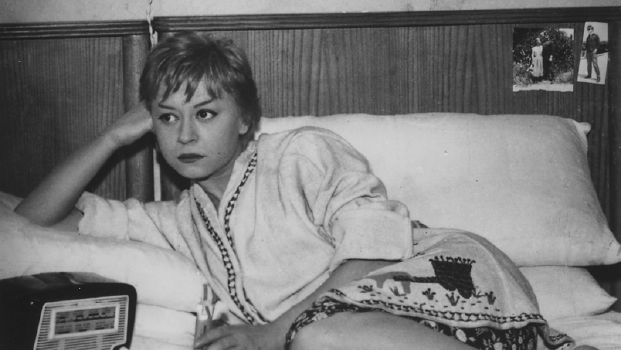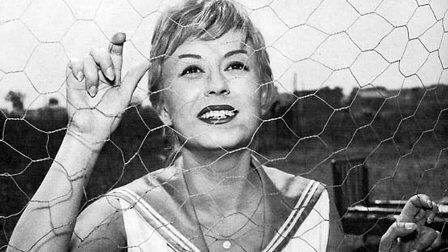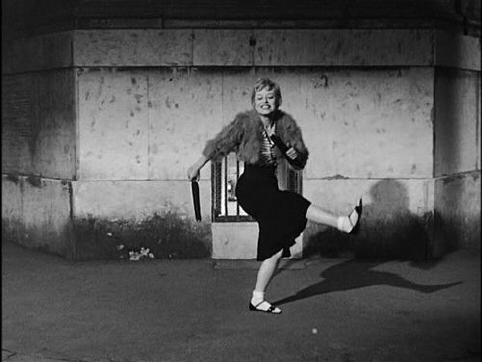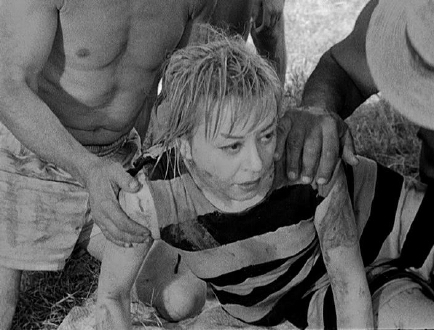
SECOND CHANCES
christopher funderburg

NIGHTS OF CABIRIA
page 2
The film:
 For starters, this time out I saw Nights of Cabiria in a context much more conducive to positivity: the opening night celebration of our annual Classic Italian Cinema series at the Jacob Burns Film Center. I program that series and obviously have a rooting interest in a great opening night: I want the audience to love the movie, I want the sponsors to be happy, I want the party to be fun, all that - I wanted Nights of Cabiria to go over like gang-busters. That is, I wanted Nights of Cabiria to shoot Al Capone in the back of the head, street-vigilante-style. Anyhoo, in the context of my job, I invariably step outside of my real opinion to an extent and watch the film through the audience's eyes - and most everyone there isn't bringing any baggage about Michaelangelo Antonioni or Mussolini's Avanguardista; they just want to indulge in a very Fellini-esque spectacle of humanity's finest aspirations, over-indulgences and foibles. And then go ingest pasta and wine and cream puffs and those little mozzarella rice balls. Man, those things were good. So, I can slip into that mindset and forget about myself at least while the film is on the screen - or maybe my critical facilities are all occupied by gauging the audience's reaction and the sponsor's mood rather than thinking too hard about the more complex aspects of the film. At an opening night, I'm in a mindset where I want things to go well, I want every film we show to be a masterpiece, I want everybody to love everything we do and come away thinking we're the greatest movie theater on the entire fucking planet and that includes the classy joint down in Bogota I was just at that had upholstered armchairs for every seat and served lightly chilled white wine on the house. At very least, I want them to think "Man, compared to this place, Film Forum is a fucking shithole!*" So, when the film started, I was in the right mindset to give Fellini and Masina's husband/wife tag-team-up another shot.
For starters, this time out I saw Nights of Cabiria in a context much more conducive to positivity: the opening night celebration of our annual Classic Italian Cinema series at the Jacob Burns Film Center. I program that series and obviously have a rooting interest in a great opening night: I want the audience to love the movie, I want the sponsors to be happy, I want the party to be fun, all that - I wanted Nights of Cabiria to go over like gang-busters. That is, I wanted Nights of Cabiria to shoot Al Capone in the back of the head, street-vigilante-style. Anyhoo, in the context of my job, I invariably step outside of my real opinion to an extent and watch the film through the audience's eyes - and most everyone there isn't bringing any baggage about Michaelangelo Antonioni or Mussolini's Avanguardista; they just want to indulge in a very Fellini-esque spectacle of humanity's finest aspirations, over-indulgences and foibles. And then go ingest pasta and wine and cream puffs and those little mozzarella rice balls. Man, those things were good. So, I can slip into that mindset and forget about myself at least while the film is on the screen - or maybe my critical facilities are all occupied by gauging the audience's reaction and the sponsor's mood rather than thinking too hard about the more complex aspects of the film. At an opening night, I'm in a mindset where I want things to go well, I want every film we show to be a masterpiece, I want everybody to love everything we do and come away thinking we're the greatest movie theater on the entire fucking planet and that includes the classy joint down in Bogota I was just at that had upholstered armchairs for every seat and served lightly chilled white wine on the house. At very least, I want them to think "Man, compared to this place, Film Forum is a fucking shithole!*" So, when the film started, I was in the right mindset to give Fellini and Masina's husband/wife tag-team-up another shot.
In light of the political slant of my re-viewing of Cabiria, I was surprised right away: notorious post-Modernist, homosexual Marxist, Catholic filmmaker Pier Paolo Pasolini is credited as a screenwriter. His presence as a screenwriter would be enough to throw my political outlook on the film all out of whack, if not for the fact that he was mainly brought because (after Mama Roma) Fellini considered Pasolini to be an expert on prostitutes. Just knowing his work, I'm guessing Pasolini didn't consider that an insult. Maybe I should back up for a moment: Nights of Cabiria follows the anti-charmed life of a prostitute played by Guilietta Masina. She's introduced clearly madly in love, hugging and kissing a man, who then steals her purse and pushes her in a river. From there, the movie is essentially a delineation of her various humiliations and foibles. Her character is freuqently described as "naive" or "child-like" but those descriptions are completely off-the-mark. She's a brash, gruff, street-smart woman who at worst could be described as a bit guillible, but she's probably a step ahead of those around her (especially the other various pimps and prostitutes) and doesn't seem especially foolish or easily taken advantage of - her constant weakness, which Fellini's script uses to hammer her repeated, is that she yearns for a better life than the one she's living. She doesn't come across as excessively materialistic or deluded about her prospects for the future; rather when towards the end of the film such a thing seems possible, she's thrilled at the prospect of a modest life with a mediocre businessman. If she's naive or child-like for aspiring to a humble escape from a life of prostitution and attempted murder, then every human being I have ever met in my entire life is a naive. Except for the prostitutes I know who are always getting beaten half to death by their boyfriends. Those ladies are childlike. If anything, it's unclear what Pasolini possibly could've brought to this somewhat generic potrayal of prostitutes: she lives in a tiny house in a wasteland on the outskirts of town, she hangs out in the park with friends that drink soda and listen to rock and/or roll while suggestively waving at passing cars and she dresses a little trashy even though she's trying to be classy. There's nothing in here that gives an audience some special insider insight into the trades of the trick. And there's certainly none of Pasolini's standard wrenching political critique.
 One thing I enjoyed infinitely more this time out was Masina's performance. I had vivid memories of her stupid Chaplin impression, but this time she really charmed me. Her funny little mambo dance is freakin' adorable and I don't how I could have possibly resisted her awkward attempts to blend in on the arm of the loverlorn movie star half-heartedly parading her around to his regular haunts. She oscillates between dignity, excitement and cluelessness in a way that's very winning. And then she does the mambo again! In recent years, I've become more forgiving of films built around stars just bein' stars - what I mean is that when I was younger I resisted movies that seemed to exist for little reason beyond getting their magnetic, charming lead performers up on the screen and letting them win us over. Obviously, a lot of those type of "star vehicles" are sloppy and stupid or by their nature unsurprising and uninspired: here's Barbara Stanwyck doing the Barbara Stanwyck thing - watch out for the ol' magoo. But for whatever reason, as I've gotten older, I've started to enjoy just watching not only the actors I like giving playing very to type in mediocre movies, but actors in general unabashedly being Movie Stars. And Masina definitely gives a star turn in Cabiria. It's fair if cliche to say she's unforgettable in this film and even back before I watched the film again and considered her performance mainly annoying, I would have admitted as much. Masina is the film's trump card and her energetic work trumps a hell of a lot - for Masina alone, it would be hard to dismiss Cabiria altogether. She's tasked with being a movie star and delivers: she reeled me in with her goofy charm and distinct, magnetic presence; it's a role written to make somebody famous, a role designed to win over an audience. But, ironically, her winning performance is one of the symptoms of the problems I had with the film and, ultimately, pretty symbolic of why I ultimately can safely say I don't like Nights of Cabiria and suspect that Fellini in general is not for me. I come to these Second Chances hoping to be converted, but they can be just as useful for helping me diagnose and articulate just what it is I don't like about an artwork or an artist - and Masina's performance, its effectiveness as a cog in Fellini's cinematic machinery proved this time to be a focal point for understanding what rubs me the wrong way about Italy's cinematic superstar.
One thing I enjoyed infinitely more this time out was Masina's performance. I had vivid memories of her stupid Chaplin impression, but this time she really charmed me. Her funny little mambo dance is freakin' adorable and I don't how I could have possibly resisted her awkward attempts to blend in on the arm of the loverlorn movie star half-heartedly parading her around to his regular haunts. She oscillates between dignity, excitement and cluelessness in a way that's very winning. And then she does the mambo again! In recent years, I've become more forgiving of films built around stars just bein' stars - what I mean is that when I was younger I resisted movies that seemed to exist for little reason beyond getting their magnetic, charming lead performers up on the screen and letting them win us over. Obviously, a lot of those type of "star vehicles" are sloppy and stupid or by their nature unsurprising and uninspired: here's Barbara Stanwyck doing the Barbara Stanwyck thing - watch out for the ol' magoo. But for whatever reason, as I've gotten older, I've started to enjoy just watching not only the actors I like giving playing very to type in mediocre movies, but actors in general unabashedly being Movie Stars. And Masina definitely gives a star turn in Cabiria. It's fair if cliche to say she's unforgettable in this film and even back before I watched the film again and considered her performance mainly annoying, I would have admitted as much. Masina is the film's trump card and her energetic work trumps a hell of a lot - for Masina alone, it would be hard to dismiss Cabiria altogether. She's tasked with being a movie star and delivers: she reeled me in with her goofy charm and distinct, magnetic presence; it's a role written to make somebody famous, a role designed to win over an audience. But, ironically, her winning performance is one of the symptoms of the problems I had with the film and, ultimately, pretty symbolic of why I ultimately can safely say I don't like Nights of Cabiria and suspect that Fellini in general is not for me. I come to these Second Chances hoping to be converted, but they can be just as useful for helping me diagnose and articulate just what it is I don't like about an artwork or an artist - and Masina's performance, its effectiveness as a cog in Fellini's cinematic machinery proved this time to be a focal point for understanding what rubs me the wrong way about Italy's cinematic superstar.
There are two inter-related problems as I see it. The first problem is that Fellini's films are too narratively opportunistic, too emotionally manipulative; in a word "cheap." The way in which Fellini takes a beaten down character like Cabiria/Maria, puts her through the grinder, offers hope for a better life for her and then pulls the rug out from under her is just too easy: it's not hard to make an audience feel bad for her, to root for her happiness and then crush us by repeating the opening scene at the climax. Sure, the trick works, we've invested, we feel for Cabiria, we feel extremely shitty when the mediocre businessman turns out to be a con artist, but it's not a difficult trick to pull. It's base melodrama and Fellini hits the notes of pathos as hard as he can - there's no subtlety to it. The film begins and ends with her lover trying to rob and kill her: the symmetry feels over-written, too perfect, too movie-ish. And the reason the final twist of the film is so devastating derives from Masina: the cinematic machinery is over-determined nonsense, but it killed me because Masina won me over. The first time I saw the film, when I didn't enjoy Masina at all, I had no real response to the ending. It was improbable melodramatic silliness. I still think it's improbable melodramatic silliness, but seeing Masina get kicked in the face one more time just was too much to bear - maybe knowing what was coming made the drawn-out scenes of her courtship by the con artist even more tense and upsetting. He plays the role perfectly. There's no reason to doubt. His scheme, to steal her meagre savings and push her off a cliff, borders on unbelieavble in terms of the amount of work he needs to put in for a few thousand lira: there's no reason for her to not fall for him, no tell-tale warning signals she misses. The only mistake she makes is thinking someone could love her. In fact, that's the driving emotional force of the film: will anyone be able to love this woman. That I, as an audience member, found her to be lovable generates all of the film's effectiveness. There's nothing but a cloying simplicity to it, "why won't someone love this lovable woman?" It's on the level of a Julia Roberts movie (its narrative machinery resembles, of course, Pretty Woman) or Sixteen Candles.
The other problem with the film is that there is a palpable condescenion and self-satisfaction coursing through it: Fellini looks down on these people, he looks down on Cabiria in particular and there's something unseemly about it. The Catholic themes, the religious salvation at the edges of the film feel casually disingeuous, like Fellini really believes Cabiria's main problem is a lack of moral rectitude, like her problems are actually very easy to solve and she's a fool to understand how to repair her broken life. That creates a real tension with Masina's lovable star performance: as a viewer, I felt a huge amount of empathy for Cabiria and the smugness of Fellini's tone clashed openly with my sympathy for a charming and helpless character, one whose essential human goodness seemed evident. And I'm not imagining things, here's what Fellini himself had to say about the film:
"The subject of loneliness and the observation of the isolated person has always interested me. Even as a child, I couldnít help but notice those who didnít fit in for one reason or anotherómyself included. In life, and for my films, I have always been interested in the out-of-step. Curiously, itís usually those who are either too smart or those who are too stupid who are left out. The difference is, the smart ones often isolate themselves, while the less intelligent ones are usually isolated by the others. In Nights of Cabiria, I explore the pride of one of those who has been excluded."
 My favorite aspects of that quote is that while Cabiria - a woman with clearly richer inner life than many of the listless, bovine women around her - rates as stupid, while by implication Fellini is one of those folks who by virtue of their brilliance finds themselves separated from the gaggle of schlubs. But I don't find Cabiria to be stupid. As I've mentioned, I find the opposite to be true - there's more to her than the women and peasants and priests and con artists around her. Masina's performance has a complexity that gives the character an aching human quality with which it's tough not to identify. Who hasn't had their heart broken or struggled to make ends meet or been a fool in love or worked a job they despised or found themselves in a miserable moment and life situation from which they cannot imagine how to extricate themselves? Fellini's diagnosis of her problem as stupidity is infuriating. Her problem is that she's human. The filmmaker's condescending attitude makes the crushing cinematic machinery seems even more cheap, like even more of a trick.
My favorite aspects of that quote is that while Cabiria - a woman with clearly richer inner life than many of the listless, bovine women around her - rates as stupid, while by implication Fellini is one of those folks who by virtue of their brilliance finds themselves separated from the gaggle of schlubs. But I don't find Cabiria to be stupid. As I've mentioned, I find the opposite to be true - there's more to her than the women and peasants and priests and con artists around her. Masina's performance has a complexity that gives the character an aching human quality with which it's tough not to identify. Who hasn't had their heart broken or struggled to make ends meet or been a fool in love or worked a job they despised or found themselves in a miserable moment and life situation from which they cannot imagine how to extricate themselves? Fellini's diagnosis of her problem as stupidity is infuriating. Her problem is that she's human. The filmmaker's condescending attitude makes the crushing cinematic machinery seems even more cheap, like even more of a trick.
I think I'll end by writing about how I mentally categorize as "good but I hate it" and Nights of Cabiria falls into that category. I don't think the film offered me much insight into Fellini's politics and how it relates to Rossellini and the New Wave, but if there's a political dimension of every aspect of being, then Fellini's makes me feel like how he could be a member of Mussolini's Hitler Youth squad and still make a movie that I could agree does not consciously have politics on its mind. The words I want to use to describe Fellini and Cabiria that keep floating around in my head are "servile" and "obsequeous" and I think the reason for that is Cabiria's enthusiastic deployment of slick, almost Hollywood melodramatics combined with a blank, unthinking "natural" Catholic, mindset. Just as one of the main characters in War and Peace dresses perfectly au courant without thinking about it, Fellini seems to absorb the zeitgeist of mid-century Italy and drop it in Cabiria without even any awareness of it. The man with the sack is a good Catholic, he protested - and then took the scene out anyway. His haughty contempt for Cabiria feels like a product of the time more than an opinion he developed during his creative process. Servile, because creating an emotionally upsetting melodrama is not challenging an audience, but giving them exactly what they want. Obsequeous for building a film around a star performance and begging us to like it. What could have mitigated my impulse to use those words? A political critique. Even a bold Catholic assertion of Catholic values a la Bresson or Tarkovsky. Cabiria is a film where the whole is more than the sum of the parts. It plays, as they say. Masina deserved her laurels. But when I take it all apart, I'm less and less impressed. But just because it made me want to cry doesn't mean I have to like it. Or even respect it.
* I'm just joking here. Film Forum remains the greatest movie theater of which I am aware and I'm only too thrilled when other repertory cinemas that showcase actual challenging, awesome programming succeed. Certainly, Film Forum has the best programming on the planet and Bruce Goldstein and Karen Cooper are my heroes.
<<Previous Page 1 2 Next Page>>
home about contact us featured writings years in review film productions
All rights reserved The Pink Smoke © 2011